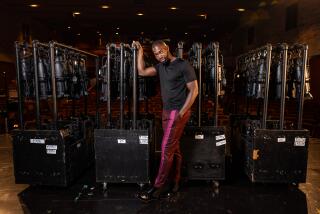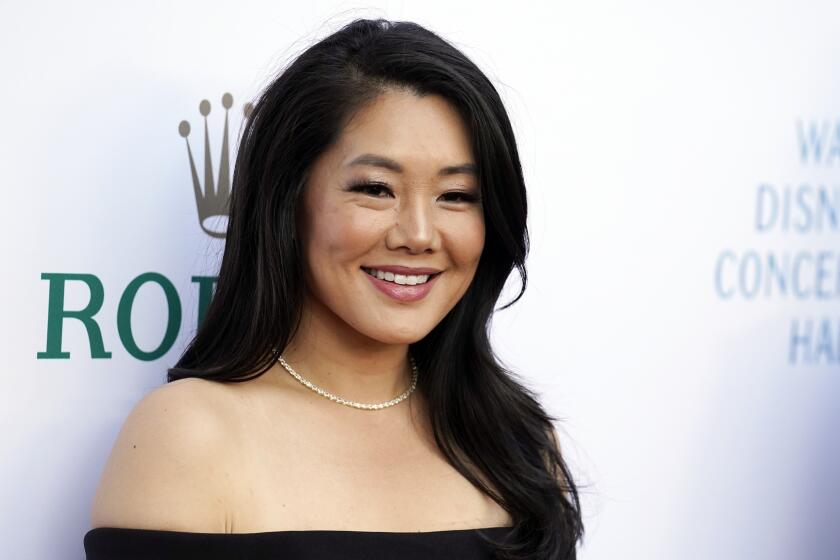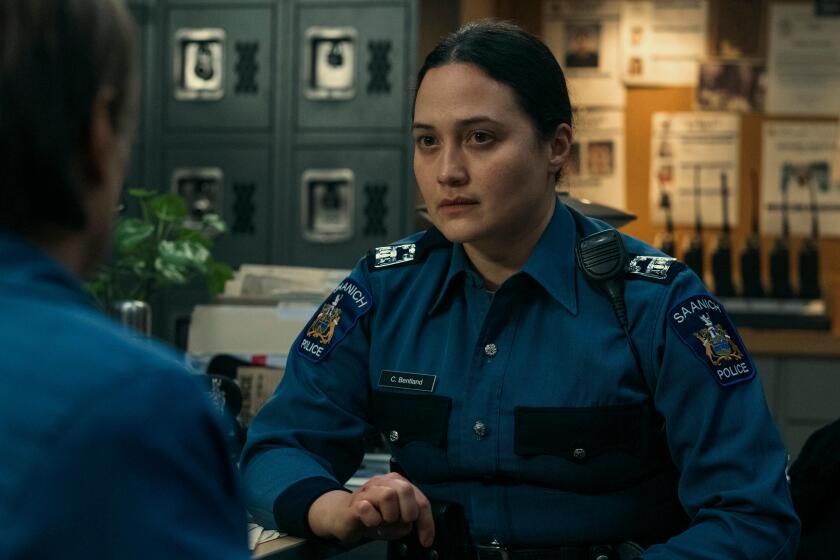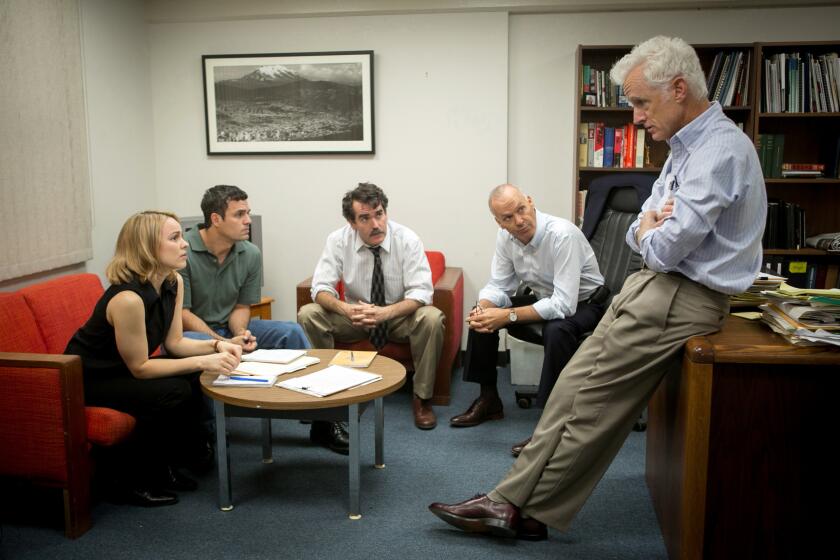A rich season for playwright Richard Greenberg
NEW YORK — “I’m too tired to be anxious,” said playwright Richard Greenberg, looking worn out with anxiety as he settled into a booth at a Chelsea diner.
This neighborhood canteen, dubbed his “office” by the late theatrical agent Helen Merrill, is where he conducts “business,” broadly defined as any professional obligation requiring him to leave his nearby apartment and temporarily abandon his real work, the writing of deliciously urbane, hyper-articulate plays.
If Greenberg seems a little strung-out these days, it’s with good reason. He may just be the busiest dramatist in America right now. Two of his plays have had their world premieres on Broadway this spring, his adaptation of “Breakfast at Tiffany’s” at the Cort Theatre and “The Assembled Parties” at Manhattan Theatre Club’s Samuel J. Friedman Theatre.
CHEAT SHEET: Spring Arts Preview
In addition, he has written the book for the musical adaptation of Todd Haynes’ 2002 film “Far From Heaven.” That show, a collaboration with composer Scott Frankel and lyricist Michael Korie (best known for their “Grey Gardens” score), opens in June at Playwrights Horizons, with luminous Kelli O’Hara in the Julianne Moore role.
When Greenberg and I met last month, “Breakfast at Tiffany’s” had just opened, he was in the final stages of fine-tuning “The Assembled Parties,” and “Far From Heaven” was still a construction job.
The reviews for “Breakfast at Tiffany’s,” most taking aim at the production, were fairly savage. (The show, one of the season’s biggest casualties, closed early.) “The Assembled Parties” would go on to charm the critics with its verbal élan and ritzy New York style. But Greenberg has long made it his policy to avoid reading the critics during what he called, in a characteristic Jamesian locution, “the strategic period.”
“My friends and family have been so well trained that they know I really mean it when I say that I don’t care if the review is good, because that can be as dangerous as when it’s bad,” he said. “It’s less demoralizing, but it can be just as confusing. What this does is focus you on the experience you’re having as opposed to the response.”
STORY: ‘Breakfast at Tiffany’s’ on Broadway to close on Sunday
Greenberg wasn’t simply prattling here for a journalist’s tape recorder. There was a searching quality to the way he talked about making “a life in the theater,” a philosophical note suggesting active contemplation of an ongoing riddle.
His career has been filled with fabulous highs (a Frank Rich love letter for his first Broadway play “Eastern Standard,” the Tony Award for “Take Me Out”) and some embarrassing lows (including the Broadway flops “A Naked Girl on the Appian Way” and the 2008 revival of “Pal Joey” with his retooled book).
The starriest moment in Greenberg’s professional life and the most conspicuous artistic fizzle was undoubtedly Julia Roberts’ Broadway debut in “Three Days of Rain” — a Kipling lesson if ever there was one in the wisdom of treating triumph and disaster just the same.
Pegged from his Yale School of Drama days as one of the best and the brightest, Greenberg has had to contend with the burden of unreasonable expectations. He has responded, as an artist only can, by being indissolubly himself. Yet the economics of this are difficult to figure out for a playwright who has avoided teaching and has a bit of a reputation for being a shut-in.
PHOTOS: Hollywood stars on stage
His long-standing relationships with Manhattan Theatre Club and South Coast Repertory — his bicoastal theatrical homes, if you will — aren’t enough, as he candidly put it, “to support a life in New York City.” (SCR has been especially good to him: “Our Mother’s Brief Affair” was Greenberg’s ninth world premiere at the Costa Mesa theater.) Yet to keep himself comfortably housed in a doorman building in Manhattan, Greenberg, 55, must also accept commissions for adaptations, dabble in film and television, and worry — a lot.
“I started in the era when Hollywood reveled in being the most cost-inefficient industry on the planet,” he said. “They used to commission a hundred scripts for every one they made. Do you remember the movies that were coming out in the mid-’80s? Every story was a fish-out-of-water story. I was terrible at it because I never know what I’m writing until I write it.”
Television, he said, appeals to him more than film because it’s closer to the way the theater works. And though he’s been “ritually disappointed” in getting his own projects produced, he likes what he sees these days on cable TV. His current obsession: TNT’s “Southland.”
“The show reminds me of the movies of the ‘70s that you wouldn’t want to eat dinner after because they were so depressing but they were kind of great. There are scenes, like this one about a hooker’s retirement party, that are so impressive. They cut off at just the right moment. A second longer and it would have gone bad.”
PHOTOS: Arts and culture in pictures by The Times
When asked if he hungers for a big TV audience, Greenberg shook his head “No.” His witty phrase-making isn’t designed for the mass market. But he’s drawn to the medium for reasons beyond the paycheck. The challenge of seizing short attention spans appeals to him, but even more he’s attracted to the speed of production.
“Do you know the trilogy ‘New York Stories’? he asked. “In the one by Scorsese, Nick Nolte played an action painter. Oddly, I relate to that. There’s something about that kind of relationship to the task of writing. I like to get jacked up on coffee and plunge into that first phase. This is one of the reasons adaptations, though interesting, are less joyful, because you start out in caution.”
Adapting a novella with as much panache as Truman Capote’s “Breakfast at Tiffany’s” was especially intimidating. “When it’s something that’s good, you try to merge with it, which means to submerge yourself,” he said.
The offer to adapt “Breakfast at Tiffany’s” came at a time when Greenberg said he needed a job. He had worked before with director Sean Mathias on the Broadway adaptation of August Strindberg’s “Dance of Death,” and he was drawn to the idea of dramatizing a book “about a gay man in love with a woman,” in which the male character has to be more or less “invented.”
“When you’re writing plays, it’s possible to believe you don’t have any real world skill,” he said. “When you’re adapting, it is really all about the mechanics, so you feel closer to, I don’t know, an accountant or someone who has a body of information. It’s not all about temperament.”
Still, he was glad to be back in the not-for-profit mode with “The Assembled Parties.” “The exigencies are far less alarming,” he said, pointing to the longer preview period and more accommodating technical rehearsal schedule.
“I had forgotten how much effort is spent on nurturing the work,” he said. “They give you the time you need to learn what the show is.”
“The Assembled Parties,” which features a top-notch theater cast that includes Jessica Hecht, Judith Light and Jeremy Shamos, had been going so swimmingly that Greenberg, a New York neurotic of the glorious old-school stripe, was starting to get nervous.
“It worried me, frankly, because the actors were getting along so well,” he said. “They’re so talented and they’re so lovely and they love each other so much that I thought we were doomed.”
The play, luxuriously unfolding in a 14-room apartment on Central Park West, is broken into two time periods, one set in 1980, the other in 2000. “It’s two Christmases because it’s all about Jews,” the playwright explained.
Greenberg used a similar (though reversed) diptych structure in “Three Days of Rain,” which was set in a Manhattan loft, the first act taking place in 1995, the second act in 1960. If the older play is about the difficulty of decoding the past, the newer play is about the difficulty of forecasting the future — complementary Greenbergian themes.
Historical gaps have intrigued him from the time he watched “The Forsyte Saga” on PBS during a “pledge week” marathon telecast that he capriciously tuned in and out of.
“That television experience was the foundation of my sensibilities,” he said. “I’m sort of anti-Aristotelian. I want to get an entire life onstage while conveying a sense of how time feels, how unstoppable it is, and how we don’t really know what’s going on because as we’re trying to weave, it’s weaving us.”
Greenberg, who grew up in Long Island, didn’t set out to be a playwright. He wanted to be F. Scott Fitzgerald, whose novel “The Great Gatsby” lured him to Princeton University. After college, he went to Harvard to do graduate work in English and American literature but dropped out after failing to finish Henry James’ “The Princess Casamassima” for a seminar.
He had acted at Princeton and, needing an occupation while skulking about Harvard Yard, decided to write a play and eventually apply to Yale’s playwriting program.
The future novelist and literary scholar was on his way to becoming a dramatist. But nothing was lost along the way: Greenberg’s plays are distinguished by their Fitzgeraldian eloquence and his formidable intellect was on display as our conversation bounced from Michael Goldman’s brilliant book “Ibsen: The Dramaturgy of Fear” to the heady influence of John Guare, who allows you “to feel the joy of his talent in his plays.”
When asked if there was an autobiographical basis to his work, he said only if you expand the definition. “I think what we call autobiography is gossip,” he said. “It’s sort of like this happened, that happened, that was her mother, and that was his aunt. I don’t do that very much because there wasn’t all that much that was interesting. If you’re writing about the places you knew, the sorts of people you knew, the things you thought about, and the things you care about, that’s an autobiography whether there’s some specific event or not.
“I write about things that I want to spend time with. I grew up with a lot of uncles and aunts and cousins. We were Jews. They make a sound, and I just very much miss that sound.”
He also seems to be fascinated by the tendency of his parents and grandparents to avoid dwelling on the hardships of the past. “That stuff was too tough, so let’s just forget it,” he paraphrased.
What gets buried along the way turns out to be of crucial, if cryptic, significance not just in “The Assembled Parties” but also in “Far From Heaven,” a musical confronting the emotional repressiveness of the 1950s.
The Frankel and Korie score has Greenberg elated to be working on this show, despite his own admission that a musical’s book writer is destined to get all the blame and none of the credit. He doesn’t mind. He enjoys the challenge of adapting a film that is so consummately a film it has to be translated into a new vocabulary. Sweetening this task is the joy he finds in a score that’s the best he has heard since “The Light in the Piazza.”
Greenberg, a survivor of what he called “one of the treatable cancers,” looked at me incredulously when I asked which plays did he think he would be remembered for.
“Who thinks about being remembered?” he shot back. “I’m about to say something adolescent: Who even has faith there’s going to be a world to be remembered in? When you look at the fragility of everything, the idea of oneself being remembered seems particularly preening. No, I am just trying to do something that’s nice in the season.”
The good news is that he’s constantly, and ever more happily, “relapsing on plays,” as he put it. “No matter what I mean to do, I go back to plays. I have to feel as long as I’m getting smarter and I still write play, the plays will get smarter too.”
More to Read
The biggest entertainment stories
Get our big stories about Hollywood, film, television, music, arts, culture and more right in your inbox as soon as they publish.
You may occasionally receive promotional content from the Los Angeles Times.







